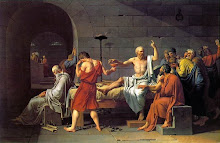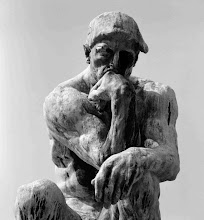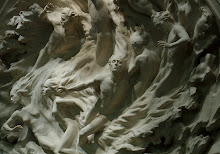The title of this post sounds preposterous, right? I mean how could postmodernism-- a term I usually utter with a mix of dread, derision, or befuddlement-- have anything to offer someone of an orthodox Christian persuasion? Well, after wading through J.M. Coetzee’s Waiting for the Barbarians, I have come to the realization that perhaps postmodernism isn’t all bad after all.
The foundation of Postmodernism is skepticism. The postmodern philosopher attacks the reliability, impartiality, and objectivity of the Cartesian-Kantian defense of reason, which asserts the mind as the starting point for an acceptable degree of certainty, and thus knowledge. The postmodern historian unmasks all political systems as collective assertions of will to power rife with internal inconsistencies, contradictions, hypocrisies, and injustices. The postmodern artist builds upon the work of his modernist forebears by further demolishing any semblance of tradition or objective standards for the craft in favor of a Heraclitian avant-garde approach to beauty that changes direction with the winds of individual or collective fancy with such celerity as to render consensus always just out of reach.
So, how could any of this be construed as wise? Well, for starters, skepticism in moderation is quite useful. It only becomes problematic when it claims a fragment of Lady Philosophy’s raiment as the totality of philosophy (See Beothius’s Consolation of Philosophy for more info). Skepticism as a method is exceedingly useful. The postmodern philosopher has indeed pointed out the limits and vulnerabilities of Enlightenment philosophy that was fast becoming an irrational rational mythology. The postmodern philosopher has debunked political theory as a metaphysical substitute. The postmodern artist does extend modern artistic instincts to their utmost absurd limits. This is wonderful news!
The success of Postmodernism leads us right back to orthodoxy. The orthodox Christian agrees with the postmodernist that reason alone cannot explain the cosmos; it must be the handmaiden of theology in order to serve its true purpose. The orthodox Christian sees postmodernism’s historical criticism as a validation of the Augustinian theology of the Two Cities. Every City of Man (any and every polity) has a life cycle and will not stand the test of time. Only the City of God (Heaven) is eternal. So the postmodernist and the Christian agree that secular history provides no ultimate solutions or true meanings without reference to something beyond itself. The orthodox Christian wants to see Modernism and Postmodernism dead and buried because they are largely hollow movements with little beauty in them. This allows for a revitalization and resurgence of the classical art that captured beauty with the closest thing to perfection this side of eternity.
I have saved the wisest aspect of Postmodernism for last. Postmodernism has sounded the death knell of the Protestant heresy. Think about it. Protestantism was founded upon individual interpretation of Holy Scripture without any magisterial authority to contravene the subjective understanding of the text. This is the very germ of Postmodernism. It took many centuries for the idea to migrate from the religious sphere to the secular public square, but the transition is now complete.
It is quite clear to me at least that Postmodernism is the intellectual heir to the Protestant heresy. Both movements sprang from a discussion of linguistics and texts and how to interpret them and quickly moved to other aspects of life from politics to culture to sexuality to identity and on and on. They both assert the primacy of the individual to decide for him or herself the fundamental questions of life. They really are intellectual cousins. They reach radically different conclusions, but their methodology is logically the same. They both lead to the same outcome, fragmentation. There is zero universality in Protestantism precisely because that is the touchstone of its heresy. There is zero universality in Postmodernism because skepticism will never allow for monopolies on subjectively constructed truth no matter how much individual or collective will to power is behind it.
The bottom line is this: The skeptical spirit of Postmodernism obliterates everything in its path, both for the better and for the worse. It is self-defeating though, suicidal really, which might explain why most of the globe is depopulating itself after it drinks this intellectual hemlock. The bad news is that Postmodernism looks to have a long life span, but the good news is that it is purging the Christian community of the heresy within its midst. It is only a matter of time before Protestantism and Postmodernism exhaust themselves. If you fracture something over and over again, it will break sooner or later. It may not happen slowly over the next couple hundred years, but mark my words, Holy Mother Church with the Barque of Peter will come to the rescue of all the wayward souls looking for saving light of Christ in their time of need. And they will be in need!
Thursday, April 1, 2010
Subscribe to:
Post Comments (Atom)











No comments:
Post a Comment